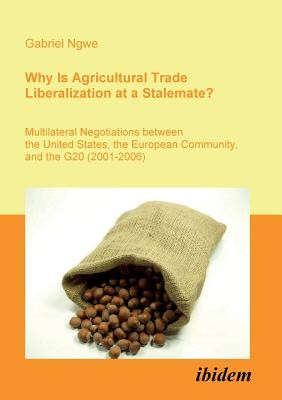
- We will send in 10–14 business days.
- Author: Gabriel Ngwe
- Publisher: Ibidem Press
- ISBN-10: 3898218600
- ISBN-13: 9783898218603
- Format: 14.8 x 21 x 0.8 cm, minkšti viršeliai
- Language: English
- SAVE -10% with code: EXTRA
Why Is Agricultural Trade Liberalization at a Stalemate?. Multilateral Negotiations between the United States, the European Community, and the G20 (2001-2006) (e-book) (used book) | bookbook.eu
Reviews
Description
Trans-border trade in agricultural goods still faces immense hurdles at the beginning of the 21st century. The USA and the EU, for example, have been protecting their markets through domestic support, export subsidies and various barriers to market access. They have thus prevented many developing countries from exporting agricultural goods in which they have a comparative advantage to them. As a result, developing countries have demanded that the ninth round of negotiations at the World Trade Organization resolves the issue of agricultural protection. Gabriel Ngwe reviews the agricultural policy of the USA, the EC and the G20 prior to 2001 and discusses the evolving of negotiations from 2001 to 2006. He further explains which parties played which role in the negotiations. Furthermore, he proposes solutions how to overcome the stalemate.
EXTRA 10 % discount with code: EXTRA
The promotion ends in 22d.12:48:00
The discount code is valid when purchasing from 10 €. Discounts do not stack.
- Author: Gabriel Ngwe
- Publisher: Ibidem Press
- ISBN-10: 3898218600
- ISBN-13: 9783898218603
- Format: 14.8 x 21 x 0.8 cm, minkšti viršeliai
- Language: English English
Trans-border trade in agricultural goods still faces immense hurdles at the beginning of the 21st century. The USA and the EU, for example, have been protecting their markets through domestic support, export subsidies and various barriers to market access. They have thus prevented many developing countries from exporting agricultural goods in which they have a comparative advantage to them. As a result, developing countries have demanded that the ninth round of negotiations at the World Trade Organization resolves the issue of agricultural protection. Gabriel Ngwe reviews the agricultural policy of the USA, the EC and the G20 prior to 2001 and discusses the evolving of negotiations from 2001 to 2006. He further explains which parties played which role in the negotiations. Furthermore, he proposes solutions how to overcome the stalemate.


Reviews